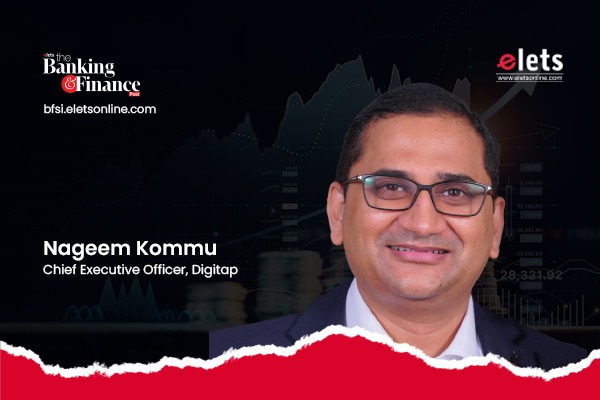Digital lending has undergone tremendous growth ensuring fintech-led credit services: CEO, Digitap


The BFSI sector currently focuses primarily on Bureau data to underwrite customers. However, close to 400 million Indians lack good access to credit due to low agency scores. To know more about the market leading AI-ML based alternative data solutions, Rashi Aditi Ghosh from Elets News Network (ENN), had a conversation with Nageem Kommu, CEO, Digitap.
What is the purpose solved by Digitap?

Digitap is an early-stage technology start-up dedicated to developing cutting-edge Artificial Intelligence (AI), Machine Learning (ML) and compliance-related digital solutions for organizations in the BFSI industry. We help BFSI firms use AI/ML-powered big data to deliver a seamless and fully compliant customer experience. This helps companies to both improve risk management and reduce fraud. We provide BFSI companies with solutions for credit guarantee and digital customer on board.
What is the differentiation of the BFSI industry by the brand?
The BFSI sector currently focuses primarily on Bureau data to underwrite customers. However, close to 400 million Indians lack good access to credit due to low agency scores. We provide BFSI companies with alternative data sources and scoring models so that they can underwrite these customers and reduce their non-performing assets (NPAs). We have market-leading AI-ML based alternative data solutions to help our customers reduce risk and increase user lifecycle value. We look at multiple data sources including bank statements, telecom, social media, e-commerce, employment, device data and location among others.
Read also | Present and future of digital lending
How have the recent guidelines issued by RBI on digital lending affected the Fintech industry?
The digital lending ecosystem has undergone tremendous growth since the advent of technological innovation, which has led to the creation of a number of fintech organizations that offer credit services. However, this expansion has given rise to concerns about borrower data privacy, unethical business practices by digital lenders, excessive involvement by third parties and mis-selling to unsuspecting customers. In addition, there have been a number of consumer complaints about digital loan apps that charge too high interest rates or engage in fraud, among other things. The Reserve Bank of India issued a detailed set of guidelines for digital lending to solve this problem and it has decided that digital loans should be credited directly to the bank accounts of borrowers and not through any intermediary.
Since Digitap is a listed TSP on the Sahamati platform, can you elaborate on the role of the company?
Account Aggregators (AA) are RBI licensed NBFCs that allow customers to consent to the transfer of financial information from one financial institution to another. Digitap is a certified Technology Service Provider (TSP) that implements the Financial Information Users (FIU) module, enabling certification of the module and offering analytics in addition to the raw data provided by the Financial Information Provider (FIP). Digitap can connect to all AAs because it is a TSP. For FIUs, Digitap offers end-to-end solutions from a technical point of view, allowing them to focus only on the relevant paperwork. We also offer alternatives to AA for bank statement parsing solutions through online banking and PDF upload in an integrated solution module.
How is Account Aggregation (AA) sparking a UPI-like movement in the financial sector?
The next significant development will be information exchange through AA platforms after the implementation of UPI in India’s BFSI industry. Thanks to the AA ecosystem, users will find it easier to quickly, securely and consistently exchange financial information. The process is user-friendly, and users will have total discretion over the information they choose to provide. Also, the AA ecosystem will be embraced faster than UPI because the entire flow and process is modeled after the UPI payment flow to give the user some familiarity.
Read also | 5 things consumers need to know about digital lending
Please elaborate on the role of data and analytics in the BFSI domain.
As the BFSI sector moves from a product-centric to a customer-centric approach, data and analytics will play an increasingly important role in the industry. Financial institutions will rely on the availability of precise data to make decisions regarding a customer’s creditworthiness and the products that can be delivered to them.

Elet’s The Banking and Finance Post Magazine has carved a niche for itself in the crowded market with exclusive and unique content. Gain in-depth insights into trend-setting innovations and transformation in the BFSI sector. Best offer for Print + Digital editions! Subscribe here➔ www.eletsonline.com/subscription/
Get a chance to meet Who’s Who in NBFCs and Insurance Industry. Join us for upcoming events and explore business opportunities. Like us on Facebook, contact us on LinkedIn and follow us further TwitterInstagram and Pinterest.
























